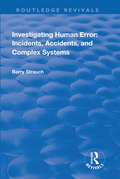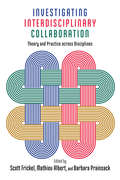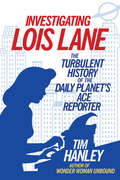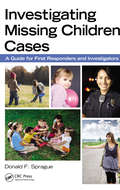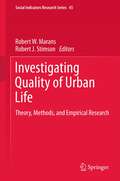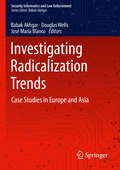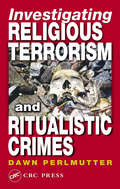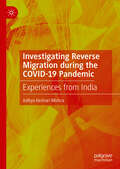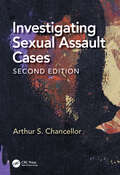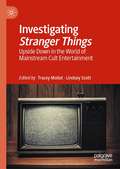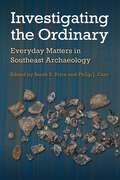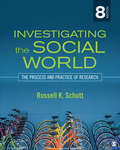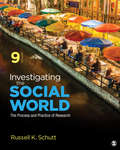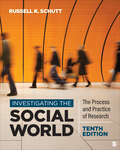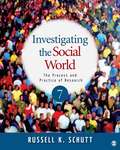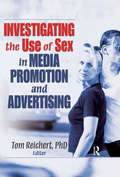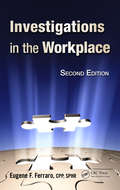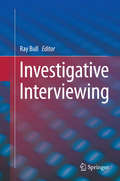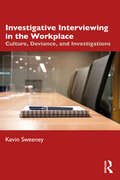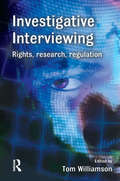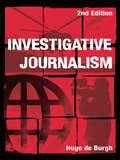- Table View
- List View
Investigating Human Error: Incidents, Accidents and Complex Systems (Routledge Revivals)
by Barry StrauchThis title was first published in 2002: This volume presents a method to investigate the human performance issues associated with an accident or incident, with a detailed discussion of the types of data to collect, and methods of collecting and analyzing data. The book should be of interest to accident/incident investigators, specialists in nuclear, chemical processing, aviation and other critical industries, safety experts, researchers and students in the field of human error, human factors, ergonomics and industrial engineering, and government agencies for regulation, health and safety.
Investigating Interdisciplinary Collaboration: Theory and Practice across Disciplines
by Helga Nowotny Barbara Prainsack Gregory J. Downey Aaron Panofsky Daniel Lee Kleinman Angela Cassidy Ali O. Ilhan Ayelet Kuper Chisato Fukuda Cyrus C.M. Mody Dave Mcbee Elise Paradis Erin Leahey Hauke Reisch Itai Vardi Jennifer Croissant Laurel Smith-Doerr Mathieu Albert Noah Weeth Feinstein Ryan Light Scott Frickel Sigrid Peterson Timothy Sacco Jimi AdamsInterdisciplinarity has become a buzzword in academia, as research universities funnel their financial resources toward collaborations between faculty in different disciplines. In theory, interdisciplinary collaboration breaks down artificial divisions between different departments, allowing more innovative and sophisticated research to flourish. But does it actually work this way in practice? Investigating Interdisciplinary Collaboration puts the common beliefs about such research to the test, using empirical data gathered by scholars from the United States, Canada, and Great Britain. The book’s contributors critically interrogate the assumptions underlying the fervor for interdisciplinarity. Their attentive scholarship reveals how, for all its potential benefits, interdisciplinary collaboration is neither immune to academia’s status hierarchies, nor a simple antidote to the alleged shortcomings of disciplinary study.
Investigating Lois Lane: The Turbulent History of the Daily Planet's Ace Reporter
by Tim HanleyIn a universe full of superheroes, Lois Lane has fought for truth and justice for over 75 years on page and screen without a cape or tights. From her creation by Jerry Siegel and Joe Shuster in 1938 to her forthcoming appearance in Batman v Superman: Dawn of Justice in 2016, from helming her own comic book for twenty-six years to appearing in animated serials, live-action TV shows, and full-length movies, Lois Lane has been a paragon of journalistic integrity and the paramour of the world's strongest superhero. But her history is one of constant tension. From her earliest days, Lois yearned to make the front page of the Daily Planet, but was held back by her damsel-in-distress role. When she finally became an ace reporter, asinine lessons and her tumultuous romance with Superman dominated her storylines for decades and relegated her journalism to the background. Through it all, Lois remained a fearless and ambitious character, and today she is a beloved icon and an inspiration to many. Though her history is often troubling, Lois's journey, as revealed in Investigating Lois Lane, showcases her ability to always escape the gendered limitations of each era and of the superhero genre as a whole.
Investigating Missing Children Cases: A Guide for First Responders and Investigators
by Donald F. SpragueTime is an abducted childs worst enemy. Seventy-four percent of abducted children who are murdered are killed within three hours of their abduction. It takes, on the average, two hours for a parent to report a child missing. This gives responders only one hour to get an investigation up and running in an attempt to locate and recover the child ali
Investigating Quality of Urban Life
by Robert J. Stimson Robert W. MaransThe study of quality of urban life involves both an objective approach to analysis using spatially aggregated secondary data and a subjective approach using unit record survey data whereby people provide subjective evaluations of QOL domains. This book provides a comprehensive overview of theoretical perspectives on QOUL and methodological approaches to research design to investigate QOUL and measure QOL dimensions. It incorporates empirical investigations into QOUL in a range of cities across the world.
Investigating Radicalization Trends: Case Studies in Europe and Asia (Security Informatics and Law Enforcement)
by Babak Akhgar José María Blanco Douglas WellsThis book provides a detailed insight into the complex dynamics of radicalization that are in play amongst contemporary society. The authors focus on understanding emerging trends and models that can be used to analyse and understand modern violent extremist and xenophobic discourse. The chapters cover multiple regions, providing a collective analysis of country-specific case studies for the formulation of best practices, recommendations and learning material. It is recommended that this book may serve as a compendium for practitioners, academics, teachers and students wishing to gain state-of-the art knowledge. Topics covered by the authors vary from hands-on practical information to tactical, operational, strategic and ethical guidance. This book provides a holistic, harmonized approach based upon European internal security strategies recognizing that internal security cannot be achieved in isolation from the rest of the world. Additionally, this material resonates with the EU’s commitment to fight extremism in a rational manner, alongside promoting human rights, democracy, peace and stability within the EU Member States.Presents a comprehensive understanding of the interconnectivities and trends behind emerging radicalisation patterns;Features newest conceptual and practical knowledge to monitor, analyse and respond to radicalization around the world;Provides a comprehensive view into the methodologies for analysis, through visualizations, case studies and applications.
Investigating Religious Terrorism and Ritualistic Crimes
by Dawn PerlmutterThe legalities of particular religious practices depend on many factors, such as the type of occult or religious activity, the current laws, and the intention of the individual practitioner. Written by the director of the Institute for the Research of Organized and Ritual Violence, Investigating Religious Terrorism and Ritualistic Crimes is the fir
Investigating Reverse Migration during the COVID-19 Pandemic: Experiences from India
by Aditya Keshari MishraThis book investigates the critical phenomenon of reverse migration during the COVID-19 pandemic in India, revealing the lived experiences of reverse migrant workers amid unprecedented social and economic upheaval. Through a comprehensive study rooted in the context of India&’s nationwide lockdown, it traces the culture of reverse migration, explores crisis-induced vulnerabilities, and envisions inclusive, empathetic, and transformative policy pathways. Spanning through compelling and insightfully articulated chapters, the volume journeys from conceptual explorations of reverse migration to grounded fieldwork shaped by returnees&’ anguish, adaptation, and resilience. It uncovers the challenges faced by returning migrants—unemployment, food insecurity, and social marginalisation—and critically evaluates government responses and support systems. The final chapter presents a forward-looking policy framework for sustainable migrant reintegration and economic empowerment. Blending scholarly insight with poignant human narratives, this book is an indispensable resource for researchers, policymakers, and readers seeking to understand reverse migration, crisis resilience, and post-pandemic recovery in India.
Investigating Sexual Assault Cases
by Arthur S. ChancellorInvestigating Sexual Assault Cases, Second Edition serves as an essential textbook for courses in investigating rape and sexual assault. As with the first edition, this second edition includes the latest research and techniques in coverage of victimology, offender typology, investigative techniques, interviewing, and legal implications. This new, second edition includes chapters on child victims and molestation, sexual homicides as potentially staged events, grooming, interviewing techniques, and same-sex, elder, and special populations as victims of sexual assault. The book fills a current void in the body of literature on the topics of rape and sex crime investigation. Many previous writings, while informative, do not address all the investigative processes necessary for an investigation to be thorough and complete. By providing a fresh approach to the topic, the author aims to augment those writings and, ultimately, improving the reader’ awareness by being much more attuned to the needs of—and taking investigative cures from—the victim. Key Features: Outlines the complete investigative process for sexual assault cases, from evidence collection and interviews to court and legal proceedings Addresses victims and victimology, offender typology, the importance of the investigative interviewing process, and working with attorneys Includes new chapters on grooming, sexual homicides, SAFE examinations, and child-specific interviewing techniques Added coverage looks at same-sex crimes, crimes against men, elder victims, and assault of vulnerable populations In addition to being used in coursework in Forensic Science and Criminal justice programs, Investigating Sexual Assault Cases, Second Edition will serve as an essential reference for police detectives, criminal and death investigators, legal professionals, sexual assault nurses, and those who provide health, and mental health, services to populations experiencing sexual assault.
Investigating Stranger Things: Upside Down in the World of Mainstream Cult Entertainment
by Tracey Mollet Lindsey ScottThis edited collection explores the narrative, genre, nostalgia and fandoms of the phenomenally successful Netflix original series, Stranger Things. The book brings together scholars in the fields of media, humanities, communications and cultural studies to consider the various ways in which the Duffer Brothers’ show both challenges and confirms pre-conceived notions of cult media. Through its three sections on texts, contexts and receptions, the collection examines all aspects of the series’ presence in popular culture, engaging in debates surrounding cult horror, teen drama, fan practices, and contemporary anxieties in the era of Trump. Its chapters seek to address relatively neglected areas of scholarship in the realm of cult media, such as set design, fashion, and the immersive Secret Cinema Experience. These discussions also serve to demonstrate how cult texts are facilitated by the new age of television, where notions of medium specificity are fundamentally transformed and streaming platforms open up shows to extensive analysis in the now mainstream world of cult entertainment.
Investigating the Ordinary: Everyday Matters in Southeast Archaeology (Florida Museum of Natural History: Riple)
by Sarah E. Price Philip J. CarrShifting the focus to everyday life in the archaeology of the Southeast USFocusing on the daily concerns, activities, and routine events of people in the past, Investigating the Ordinary argues for a paradigm shift in the way southeastern archaeologists operate and urges them to think of the archaeological record in new ways. Instead of dividing archaeological work by time periods or artifact types, the essays in this volume unite separate areas of research through the theme of the everyday. The contributors to this volume bring together case studies detailing ordinary people and their lives, spanning the Paleoindian period to the nineteenth century. The essays include an examination of how the white-tailed deer was entangled in the lives of Middle Archaic people not only as a food source but as a social and spiritual creature, as well as a look at the domestic lives of those who made exotic goods for the political and social elites in the Middle Woodland period. Cooking vessels in the Late Archaic period help trace the daily lives of the many people involved in their production, use, and eventual deposition. Mound sites are reconsidered in light of the everyday--assessing not only the meaning of the sites but the mobilization of labor and the deployment of resources that went into creating them. Taken together, these essays demonstrate that attention to everyday life can help researchers avoid overemphasizing data and jargon and instead discover connections between the people of different eras. This approach will also inspire archaeologists with ways to humanize their research and engage the public with their work and with the deep history of the southeastern United States. A volume in the Florida Museum of Natural History: Ripley P. Bullen Series Contributors: Philip J. Carr | Sarah E. Price | D. Shane Miller | Jesse Tune | Christopher B. Rodning | Jayur M. Mehta | Bryan S. Haley | Lance Greene | Kandace D. Hollenbach | Stephen B. Carmody | Ashley A. Dumas | Christopher R. Moore | Richard W. Jeffries | Asa R. Randall
Investigating the Social World: The Process and Practice of Research
by Russell K. SchuttIn this exciting new Eighth Edition of his leading social research text, author Russell K. Schutt, an award-winning researcher and teacher, continues to make the field come alive through research stories that illustrate the methods presented in each chapter. Through numerous examples and hands-on exercises that help students learn by doing, Investigating the Social World helps readers understand research methods as an integrated whole. Readers will learn to appreciate the value of both qualitative and quantitative methodologies and understand the need to make ethical research decisions while also learning about research on contemporary social issues like the Internet and social relations, the police response to domestic violence, the sources of democracy, the determinants of voting, the impact of disasters, and the causes of violence. Contributor to the SAGE Teaching Innovations & Professional Development Award
Investigating the Social World: The Process and Practice of Research
by Russell K. SchuttIn this exciting new Eighth Edition of his leading social research text, author Russell K. Schutt, an award-winning researcher and teacher, continues to make the field come alive through research stories that illustrate the methods presented in each chapter. Through numerous examples and hands-on exercises that help students learn by doing, Investigating the Social World helps readers understand research methods as an integrated whole. Readers will learn to appreciate the value of both qualitative and quantitative methodologies and understand the need to make ethical research decisions while also learning about research on contemporary social issues like the Internet and social relations, the police response to domestic violence, the sources of democracy, the determinants of voting, the impact of disasters, and the causes of violence. Contributor to the SAGE Teaching Innovations & Professional Development Award
Investigating the Social World: The Process and Practice of Research
by Russell K. SchuttIn this Ninth Edition, award-winning author Russell K. Schutt continues to make the field come alive with current, compelling examples of high quality research and the latest innovations in research methodology, along with a clear and comprehensive introduction to the logic and techniques of social science research. New to this Edition: The latest advances in research methods are woven into the text from over 90 new research articles and books, covering topic like guidelines for writing research questions; distinguishing conceptual frameworks; techniques of video ethnography; abductive analysis; the value of systematic literature reviews and new human subjects rules; concerns about replicability and publication bias; and the rise of predatory journals. The rapidly increasing role of the Internet in both social relations and social research is reflected in new sections on systematic literature reviews, advances in online survey methods, geodata, digital ethnography, web experiments, online qualitative research, and new sources of big data. Current examples using research on pressing social issues such as inequality, healthcare, and police behavior offer students illustrate how social research contributes to understanding issues that are in the news and shaping their world.
Investigating the Social World: The Process and Practice of Research
by Russell K. SchuttIn this Ninth Edition, award-winning author Russell K. Schutt continues to make the field come alive with current, compelling examples of high quality research and the latest innovations in research methodology, along with a clear and comprehensive introduction to the logic and techniques of social science research. New to this Edition: The latest advances in research methods are woven into the text from over 90 new research articles and books, covering topic like guidelines for writing research questions; distinguishing conceptual frameworks; techniques of video ethnography; abductive analysis; the value of systematic literature reviews and new human subjects rules; concerns about replicability and publication bias; and the rise of predatory journals. The rapidly increasing role of the Internet in both social relations and social research is reflected in new sections on systematic literature reviews, advances in online survey methods, geodata, digital ethnography, web experiments, online qualitative research, and new sources of big data. Current examples using research on pressing social issues such as inequality, healthcare, and police behavior offer students illustrate how social research contributes to understanding issues that are in the news and shaping their world.
Investigating the Social World: The Process and Practice of Research
by Russell K. SchuttThe Tenth Edition of the bestselling Investigating the Social World provides students with the critical skills necessary to evaluate research and to carry out their own research. Each chapter integrates instruction in the various core research methods with investigation of interesting aspects of the social world. The book has always sought to communicate the excitement of social research and the importance of carefully evaluating the methods we use in that research. This edition also includes updated coverage of each research method and features many new examples reflecting research on the key issues we have experienced since 2020: the COVID-19 pandemic, the rise of social justice movements, and threats to democracy. It also includes exercises based on the 2020 General Social Survey dataset. This textbook is also available in SAGE′s Vantage platform for the first time. This title is accompanied by a complete teaching and learning package in SAGE Vantage, an intuitive learning platform that integrates quality SAGE textbook content with assignable multimedia activities and auto-graded assessments to drive student engagement and ensure accountability.
Investigating the Social World: The Process and Practice of Research
by Russell K. SchuttThe Tenth Edition of the bestselling Investigating the Social World provides students with the critical skills necessary to evaluate research and to carry out their own research. Each chapter integrates instruction in the various core research methods with investigation of interesting aspects of the social world. The book has always sought to communicate the excitement of social research and the importance of carefully evaluating the methods we use in that research. This edition also includes updated coverage of each research method and features many new examples reflecting research on the key issues we have experienced since 2020: the COVID-19 pandemic, the rise of social justice movements, and threats to democracy. It also includes exercises based on the 2020 General Social Survey dataset. This textbook is also available in SAGE′s Vantage platform for the first time. This title is accompanied by a complete teaching and learning package in SAGE Vantage, an intuitive learning platform that integrates quality SAGE textbook content with assignable multimedia activities and auto-graded assessments to drive student engagement and ensure accountability.
Investigating the Social World: The Process and Practice of Research (7th Edition)
by Russell K. SchuttSchutt (sociology, U. of Massachusetts Boston) provides students with a textbook on the use of social science research methods, integrating methods with investigation of various topics in the social world and instructing students on critical skills and how to use methods in practice. This edition has more coverage of methods that incorporate recent developments in response to the spread of cell phones and the use of the Internet, including more on web surveys and added sections on Internet-based forms of qualitative research. It has new and updated coverage of qualitative and mixed methods techniques such as narrative analysis, conversation analysis, visual methods, participatory based research, netnography, online interviewing, and qualitative research reports; more on statistics, including inferential statistics and regression analysis, with new sections on calculating chi-square and interpreting multiple regression results; updated exercises; and new and updated examples such as social networking, aggression and victimization, job satisfaction, and international social policies, including more international emphasis.
Investigating the Use of Sex in Media Promotion and Advertising
by Tom ReichertThe latest scholarship on one of today&’s most pressing issues Today, it is obvious that sexual content is a prevalent aspect of the media and that the intensity of this content has increased in recent years. Less obvious, however, are the direct effects the strategic use of sexual content has on audiences. Investigating the Use of Sex in Media Promotion and Advertising presents the latest scholarship on the role of sex in the most common media outlets-television programming, radio "shock jocks," music videos, magazines, and advertising. The eye-opening contributions from over a dozen recognized experts in the field provide useful empirical evidence on media-conveyed sexual stimuli and look toward moving the public dialogue on sex in the media further along. Often, opinions regarding sex in the media have little or no scientific grounding and even when scientific-grounded arguments are offered, they suffer from wide gaps in research-based knowledge. Investigating the Use of Sex in Media Promotion and Advertising is the important compilation that fills these knowledge gaps. In delving into this pressing issue, it not only offers timely findings that provide an indication of the nature, prevalence, and effects of sexual information when used as a promotional tool, but suggests new directions for the study of sex and media as well. This informative text is also extensively referenced and features numerous tables to clearly present research data. Chapters in Investigating the Use of Sex in Media Promotion and Advertising examine: the nature and extent of sexually appealing newscasters primarily on cable news programs commentary and camera angles of women&’s sporting events in the 2004 Summer Olympic Games the efficacy of both sexual content and sexual self-schema on consumers&’ attitudes toward promotional announcements, advertised programs, viewing intention, and self-reported arousal the history and content analysis of "shock jock" radio like the Howard Stern and the Bob & Tom shows the relationship among sexual content in music videos, viewer enjoyment, and actual product purchase intention Maxim magazine&’s cover formula and the competitive response from other men&’s lifestyle magazines the efficacy of men&’s magazines&’ sexual cover models on consumer outcome variables, including interest and purchase intention an international perspective of nudity in advertising in magazines versus on television a case study of the sexual appeals used in several billboard ads for the Hard Rock Hotel and Casino in Las Vegas and much more! Filled with insightful and groundbreaking information, Investigating the Use of Sex in Media Promotion and Advertising is a vital resource for advertising and media professionals as well as educators and upper-level and graduate students in media, communications, and advertising programs.
Investigations in the Workplace
by Eugene F. Ferraro Ban Seng Choo T.J. MacGinleyThe process of investigation is dynamic and fluid. The approach must be reasonable and the investigator flexible. However, in order to be successful, every investigation must have a meaningful purpose and be executed ethically and lawfully.Inevitably, employers must invest time, money, and patience to ensure they obtain demonstrable and actionable
Investigative Interviewing
by Ray BullThis edited volume reviews the latest research on investigative interviewing in order to provide insights on the psychological processes of the person being interviewed as well as to offer guidelines for conducting credible and useful interviews. Critical and controversial areas are highlighted (eg. false confessions, child interviewing) in order to bring clarity to how these interrogations are to be conducted. Chapters focus on these areas to provide comprehensive views of theoretical, evidence-based background, as well as practical considerations of interrogation settings and procedures. The contributors are internationally respected scholars in the field of psychology and law with particular expertise in the interviews that are critical to legal proceedings. And attention is given to the criminal justice system in international perspective.
Investigative Interviewing in the Workplace: Culture, Deviance, and Investigations
by Kevin SweeneyBased on extensive interdisciplinary research and the author’s over 30 years of experience in the field, this book provides best practice skills for auditors and investigators in any type of investigation and adapts them to ensure they are relevant to a corporate environment where the powers available to police are absent. In addition to providing technical skills and practical advice on investigative interviewing, former police investigator Kevin Sweeney explains how to analyze information to assist in the investigation and to identify emerging trends to provide opportunities to prevent problems before they occur. Readers will come to understand legal concepts such as the chain of evidence, the psychological factors involved in questioning, and the sociological factors that can help to build a macro understanding of the organization and the event in question. This book will become an essential resource for professionals involved in auditing or investigation work of any type in the corporate or public sectors, in contexts including human resources, employee relation investigations, auditing, or where criminal activity is suspected.
Investigative Interviewing: Current Developments And Future Directions
by Tom WilliamsonThe objective of this book is to review the position of investigative interviewing in a variety of different countries, with different types of criminal justice systems, and consists of chapters written by leading authorities in the field, both academics and practitioners. A wide range of often controversial questions are addressed, including issues raised by the treatment of detainees at Guantanamo Bay, The Reid model for interviewing and miscarriages of justice, the role of legislation in preventing bad practice, the effectiveness of ethical interviewing, investigative interviewing and human rights, responses to miscarriages of justice, and the likely future of investigative interviewing. The book also makes comparisons between British and American approaches to detention without trial, and the role of confession evidence within adversarial legal systems. It also develops a set of proposals to minimise the risks of miscarriages of justice, irrespective of jurisdiction.
Investigative Interviewing: Psychology, Method and Practice
by SPHR), Eugene Ferraro (CPPThere are few skills more important to the modern fact finder than the ability to obtain information through effective interviewing. While most interviewing books are intended for law enforcement, they often present harsh and accusatory techniques that can be counterproductive in private sector investigations.Investigative Interviewing: Psychology,
Investigative Journalism
by Hugo De BurghPraise for the first edition: ‘A surprising book. I’m surprised that it hasn’t been done before, and I’d also be surprised if anyone did it better.’– Roger Cook, The Cook Report, Central Television ‘A book that no aspiring student of the subject can do without.’ – Jon Snow, Channel 4 News Investigative journalism has helped bring down governments, imprison politicians, trigger legislation, reveal miscarriages of justice and shame corporations. Even today, when much of the media colludes with power and when viciousness and sensationalism are staples of formerly high-minded media, investigative journalists can stand up for the powerless, the exploited, the truth. Investigative Journalism provides an unrivalled introduction to this vital part of our social life: its origins, the men and women who established its norms and its achievements in the last decades. Two chapters describe the relationships with the law, bringing us up to date, and others deal with the professional techniques, the sociology and the teaching of investigative journalism. A further new chapter examines the influence of the blogosphere on investigative journalism. The case studies of the first edition have been supplemented by new chapters: the investigators and methods which revealed the subcontracting of the torture of Iraqi prisoners; how the murder of Stephen Lawrence was treated in the Daily Mail; the tabloids and their investigations; BBC Panorama.
